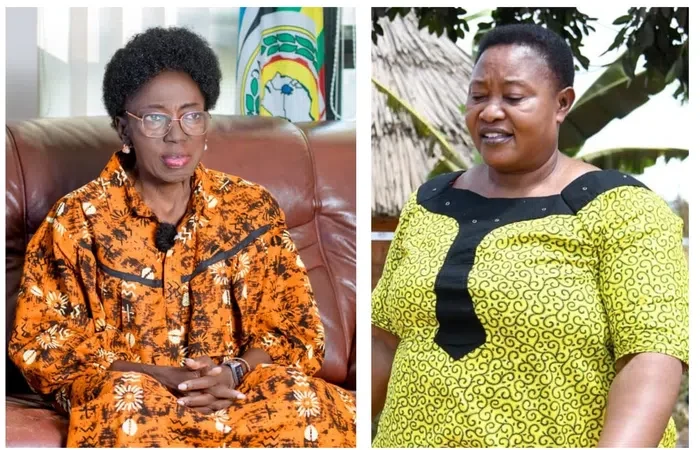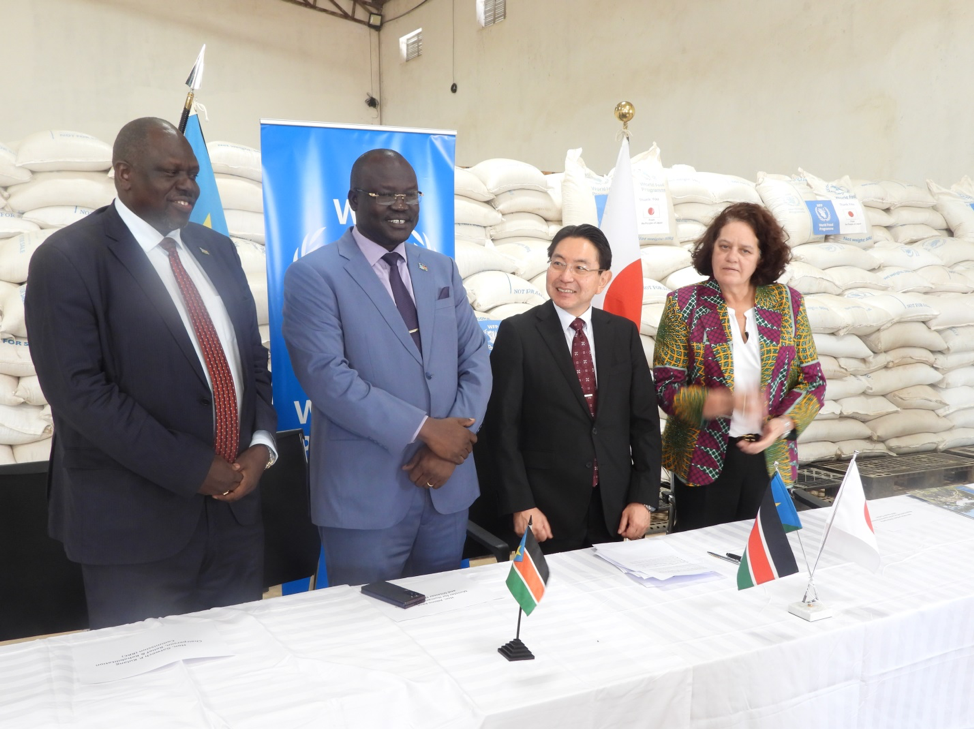Albino Akol Atak, Minister of Humanitarian Affairs (2nd L), Toshio Odagiri, the Ambassador of Japan in South Sudan (2nd R) and Mary-Ellen McGroarty, (R) WFP’s Country Director attend handover ceremony of food in Juba on Wednesday.
The World Food Programme (WFP) on Wednesday received food from the Japanese government to be distributed to 61,350 people in areas affected by high levels of food insecurity across the country.
The donation of 11,115.668 metric tons of rice will facilitate the provision of life-saving food assistance to 37,000 crisis- affected people, including displaced populations affected by conflict and flooding, as well as populations in counties classified under emergency and catastrophe food insecurity levels according to the Integrated Food Security Phase Classification (IPC).
Mary-Ellen McGroarty, WFP’s Country Director, and Representative in South Sudan said during the handover ceremony in Juba, that the contribution from the government of Japan will also support the provision of school meals to 24,350 school- going boys and girls for three months ensuring that they remain in school.
Albino Akol Atak, Minister for Humanitarian Affairs and Disaster Management, said that the contribution from the government of Japan will ease and boost the capacity of WFP to support the most vulnerable people.
“This is why as the government of South Sudan, we are grateful for what WFP is doing and we are grateful for the contribution from the government of Japan,” Atak said.
Atak noted that climate change induced impacts in the form of delayed rains and drought have exacerbated the already dire humanitarian crisis in the country.
He disclosed that the situation has been further compounded by communal conflict and the unfolding humanitarian crisis caused by the ongoing conflict in neighboring Sudan since April 2023.
“Now we can say with this help we are reducing the number of people that are vulnerable because some of them will be catered for,” Atak said.
More than 7 million people are at risk of severe hunger this year, according to the IPC report released by UN agencies.
“This year we are going to deal with very difficult floods, according to information provided to us from the government of Uganda the level of water is rising in Lake Victoria and as a result of that the government of Uganda has started releasing water from the Owen Falls Dam in Jinja, they started by releasing 2,600 cubic meters but now days they reduced to 2,400 cubic meters and they are going ahead to reduce, this is based on our request because we cannot afford this water to pass through our Nile River in huge quantity that will worsen flooding,” Atak disclosed.
He noted that 3.3 million people in Northern Bhar El Ghazal, Unity, Warrap, and Upper Nile, Jonglei and Central Equatoria State are expected to be most affected by heavy flooding, adding that the incoming rains are expected to worsen the flooding situation in most parts of the country.
Toshio Odagiri, the Ambassador of Japan in South Sudan said the food assistance comes at the time when the humanitarian situation remains dire and continues to deteriorate due to growing food insecurity and the influx of refugees and returnees from Sudan.
“The Japanese rice will be distributed to people who have been classified by WFP as food insecure and in emergency and in catastrophe situation,” Toshio said.
Gatwech P. Kulang, Chairperson of the Relief & Rehabilitation Commission (RRC) called on more donors to emulate the government of Japan and contribute towards the humanitarian response effort in the country.
He noted that the conflict in Sudan has triggered influx of over 800,000 refugees and returnees, adding that an estimated 997,743 returnees who had fled previous internal conflicts to neighboring countries have so far returned home.
“This contribution has come at the right time, and together with the WFP leadership we will work jointly in order to reach the communities in need of this assistance,” Kulang said.
In 2025, WFP plans to provide school meals to over 400,000 school children. The school meals program is critical to ensuring children enroll and stay in schools.
School meals have proven to contribute to improved school attendance and have the potential to support the development of South Sudan’s human capital.









